Six graduate students from Florida universities have each received $2,000 from the Florida Sea Grant Scholars program to support their research in timely and innovative ocean and coastal-related studies.
The 2014 Florida Sea Grant Scholars are:
- Danielle Puls, University of Florida
- Arvind Shantharam, Florida State University
- Abigail Clark, University of Florida
- Samantha Feingold, University of Miami
- Richard Hodel, University of Florida
- Ryan Lind, University of Miami
This year’s scholars are conducting research that is important to the health of ocean ecosystems statewide. Research areas range from finding cost-effective fish feed for aquaculture to conducting DNA sequencing of mangroves to see how they will respond and adapt to climate change. In addition to the monetary award, each student will have the chance to meet with Sea Grant’s outreach faculty, and learn about Sea Grant’s statewide program of extension and education.
In 2012, the inaugural year of the program, there were a total of five scholars. This year, Karl Havens, director of Florida Sea Grant, made the decision to fund six.
“We are pleased that Florida Sea Grant can support the research of such outstanding young professionals, and give them an opportunity to learn about our program, including the exciting work by our extension agents in Florida coastal communities,” Havens said.
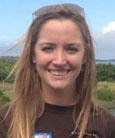
Danielle Puls
Danielle Puls’ research is aimed at uncovering information to help resource managers identify sponge species that are more tolerant to algal blooms. Her goal is to identify which species would work best for restoration projects. Since the 1990s, Florida Bay has experienced algal blooms that have caused mass sponge die-offs. Puls’ study will give experts insights into which sponge species are more viable to regrowth.
She also surveys boat patterns in Miami-Dade and Broward counties, and said her interest in ocean science stemmed from growing up on the coast of Florida.
“Because of its inherent qualities, the ocean is still a very much unknown frontier which sparked my interest in studying it,” Puls said. “My adviser came to me with this idea of researching sponge mortality, and I jumped on board because I was really interested in the implications that these sponge die-offs had on the beautiful ecosystem that is Florida Bay.”
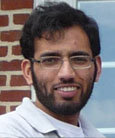
Arvind Shantharam
Arvind Shantharam’s research goal is to determine the extent to which animals have bio-accumulated hydrocarbons from the Deepwater Horizon oil spill. The purpose of the study is to help understand the indirect effects that oil can have in a natural marine ecosystem, such as the Gulf of Mexico. His adviser, Amy Baco-Taylor, an assistant professor of biological oceanography at Florida State University, said Shantharam has been preparing for this study through various field projects.
“He is an extremely motivated individual,” Baco-Taylor said. “He diligently worked the long shifts required on a small ship with 24-hour operations, with no complaints. He also eagerly learned the methods for deploying and recovering equipment and for processing and preserving samples.”
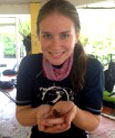
Abigail Clark
Abigail Clark is working on investigating how the virus PaV1 is affecting spiny lobster populations in the Florida Keys. The virus has severely impacted the high-value fishery. Her study is part of a larger, multi-year study to understand and control the spread of the disease by changing lobster management and fishing policies.
Clark said her her love of lobsters began in childhood.
“My parents oftentimes took my siblings and me to the beach, where we played in and around intertidal pools,” Clark said. “Growing up in New England, I also took an interest in studying and eating the American lobster. These combined interests and experiences inspired me to subsequently intern at the New England Aquarium (Boston) during my undergraduate career at Emmanuel College. At the aquarium, I studied the American lobster as it relates to epizootic shell disease.”
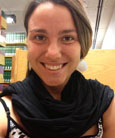
Samantha Feingold
Samantha Feingold is studying the 2012 closing of the HOVENSA oil refinery in St. Croix, which resulted in a loss of $580 million from the island’s economy, and how it impacted the island’s fishery. Her adviser, Sarah Meltzoff, associate professor of marine affairs and policy at the University of Miami, said Feingold has worked hard to network and prepare for her ethnographic study.
“She has done the background research in order to understand the field situation on St. Croix and the different perspectives of local stakeholder groups,” Meltzoff said. “Through NOAA, she has all the important field contacts to allow her to carry out her fieldwork.”
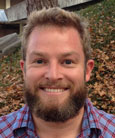
Richard Hodel
Richard Hodel is using DNA sequencing to determine the genetic diversity of red mangroves in South Florida. This information will be helpful in predicting how the mangroves might respond and possibly adapt to climate change impacts such as sea level rise.
Mangroves provide many ecosystem services such as habitats to juvenile fish, bird and invertebrate species. They also help protect the coast from storm surge and also aid in water filtration, making coastal communities more resilient to damages from disturbances.
Hodel’s proposal is focused on the conservation of the red mangroves. He said he hopes his data can be used to create effective management strategies along the coast.
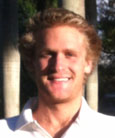
Ryan Lind
Ryan Lind’s research focuses on determining the most cost-effective feed for microscopic animals called rotifiers, which are used to feed young fish in aquaculture. Because the success of aquaculture depends on cost-effective production at every level, Lind aims to determine which types of feed result in a high rate of growth and a good quality of rotifiers at a low cost.
Daniel Benetti, director of the aquaculture program at the University of Miami said Lind is the perfect student for the undertaking. “Currently, Ryan is our lead rotifier production volunteer, as well as a top student in our program,” Benetti said. “Ryan can produce excellent work and I am certain that he will succeed in accomplishing all proposed goals, which are rather important.”




